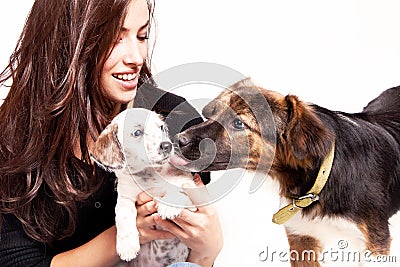STAY HOME FOR A COUPLE OF DAYS WHEN YOU FIRST GET THE DOG.
For most
people, the best time to devote a couple of days to the new pup will be the
weekend. It would be great if you could take a couple of days off work—say a
Friday and Monday—to give you and the
pup a four- to five-day window of getting to know each other. Or take a day and
a half so that the day you go back to work is only a half day and you can get
home to spend the other half with the pup, who has spent what are probably his
first hours totally alone.
You don’t
have to focus on the dog, but just your presence can make him feel secure.
Extended time spent together will give you information about his temperament.
This doesn’t mean you can’t go out, but try to spend as much time around the
house as possible so there’s a chance for low-key bonding to take place. One of
the most important things for a puppy to learn, aside from house-training, is
to feel comfortable with your coming and going from the house.
AVOID A BUSY WEEKEND FOR THE HOMECOMING.
If there’s
a lot of confusion and excitement in the house and lots of people coming and
going, it can raise the stress level during the dog’s transition into your
family. Of course, if all that activity is normal for you—if your household is
normally like Grand Central Station—then maybe the dog had better get a taste
of it right off the bat! However, it would be best to keep strangers to a minimum
in the beginning and give the new dog time to settle down and settle in. It’s
really not necessary for all your friends and your children’s friends to pay a
visit to meet the new arrival in the first forty-eight hours.
DON’T OVERSTIMULATE THE
NEWCOMER ON THE FIRST DAY AND NIGHT.
Keep it
cozy and relaxed without letting the dog spin out with excitement. This is
especially true for puppies, who tire quickly and can get too worked up. You
wouldn’t pass an infant hand to hand to be dandled by a bunch of people. Keep
it simple. Family members only at first. And no matter how excited or happy the
people may be, try to save shrieks and shouts of delight for after the dog has
had a chance to settle in.
COME AND GO WITHOUT DRAMA.
Right from
the beginning it will make life easier for both of you if your dog accepts your
departures and returns. If you don’t make any fuss about it, neither will the
puppy.
Use a
catch phrase like “See you later” and just leave. Go out for a minute or so,
then return. Give the pup a brief pat on returning—no big fanfare—and then
leave again, using the “See you later” phrase. Stay out for longer this time
before coming back inside. Once again, make sure your return is no big deal.
Copyright © Tracie Hotchner – Originally appeared in The Dog Bible: Everything Your Dog Wants You to Know by Tracie Hotchner




